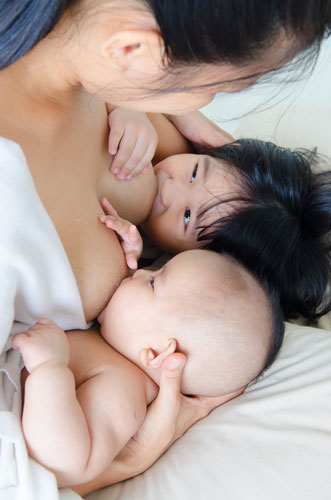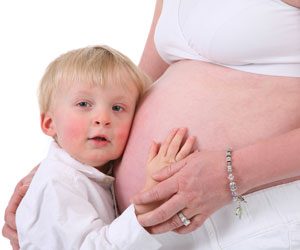 You may begin researching tandem breastfeeding while pregnant. One day, you are still blissfully breastfeeding your baby or toddler when you find out you are pregnant again. Perhaps you planned another pregnancy or perhaps it has come as a surprise. Many women in this position find themselves instantly questioning their existing breastfeeding relationship. Can you continue to breastfeed during a new pregnancy? Will doing so adversely impact your unborn baby? Supposing you do, what happens when the new baby is born? Will you have enough milk to feed two children and what if you don’t? This article aims to answers these questions and a few more about tandem breastfeeding.
You may begin researching tandem breastfeeding while pregnant. One day, you are still blissfully breastfeeding your baby or toddler when you find out you are pregnant again. Perhaps you planned another pregnancy or perhaps it has come as a surprise. Many women in this position find themselves instantly questioning their existing breastfeeding relationship. Can you continue to breastfeed during a new pregnancy? Will doing so adversely impact your unborn baby? Supposing you do, what happens when the new baby is born? Will you have enough milk to feed two children and what if you don’t? This article aims to answers these questions and a few more about tandem breastfeeding.
What is tandem breastfeeding?
For the purpose of this article, when we refer to tandem breastfeeding we are talking about breastfeeding two children who are not twins. While obviously some of the practicalities of feeding twins might be similar to feeding two differently aged siblings, this is essentially where the similarity ends. There are many considerations that a woman feeding a new baby and an older child together need to consider, that doesn’t exist in twins breastfeeding relationship.
Preparing for Tandem Feeding While Pregnant
Can I continue to breastfeed in pregnancy?
The simple answer is, generally yes… with a couple of provisos. If you do a quick search on the internet you are sure to find just as many blog posts from those claiming breastfeeding is safe as you will from those warning that the viability of your pregnancy will be threatened. So rather than trusting general cyber-dialogue, it’s always best to turn to research. Reading quality information can help you learn more about tandem breastfeeding while pregnant.
There have been a few studies on the impacts of breastfeeding on pregnancy. To sum these up, there is no evidence that shows breastfeeding will endanger a pregnancy where the woman has no history of miscarriage prior to 20 weeks or of preterm labour after 20 weeks (Ishii, 2009; Moscone & Moore, 1993).
That is not to say there are not women who have their first miscarriage while breastfeeding another child. However it is important to remember that breastfeeding alone, where no other risk factors exist, is unlikely to be the reason for a miscarriage. The sad truth is that one in four Australian women will experience a miscarriage (“Miscarriage Rates In Australia,” n.d.), and the American Pregnancy Association reports a similar statistic (“Miscarriage | American Pregnancy Association,” n.d.). There are many reasons for miscarriage, and in most cases the answer is never found.
Will my Unborn Baby Miss Out on Valuable Nutrients?
After the risk of miscarriage, the next most commonly debated risk of breastfeeding during pregnancy is that is takes ‘the goodness away from the unborn baby.’ This could not be further from the truth. The reality is that your unborn baby gets first dibs on available nutrients, even before you.
Thinking about this a little further it seems obvious that the person who perhaps needs a little more consideration when it comes to nutrients is in fact you. We know that ‘eating for two’ is a myth and that instead a moderate increase in nutritional intake is recommended. There are no firm statistics on what kind of calorific intake a breastfeeding, pregnant woman might need. However, it seems sensible to ensure that you eat very well, follow current nutritional recommendations for pregnancy, and consider a good quality pregnancy multi-vitamin supplement if you feel your diet is a little wanting.
What About Colostrum for my Newborn?
Another common concern of pregnant, breastfeeding women is that because they are already breastfeeding, the natural process of producing colostrum for their newborn will be disrupted. It may be suggested to you that you only feed your toddler or older child from one breast towards the end of the pregnancy. However the production of colostrum is trigger by hormonal changes in the body during later pregnancy. It appears that irrespective of breastfeeding occurring, breasts will revert to producing colostrum of their own accord.
Will I continue to produce a good supply of milk during pregnancy?
Many women will find that their milk supply wains as pregnancy progresses. Around the same time the breasts are gearing up to produce colostrum. This often means that rather than the rick mature milk he or she is used to, your toddler or older child may find that colostrum is what is on offer. Colostrum is saltier than mature milk and sometimes this prompts a child to ween. Maybe this was Mother Nature’s plan! However there are many children who don’t mind the taste of colostrum and will go on feeding. Either way, there will still be colostrum for your newborn when they arrive.
What about my toddler’s health?
Breastfeeding your child will always be of benefit to him or her. Your milk is a valuable source of nutrients. In the majority of cases when we discuss tandem breastfeeding we will be referring to a toddler and a newborn. However, if your children are very close together, your older child may well be under a year old.
There is little in the way of research on the nutritional value of breast milk produced during pregnancy. However given your older child will be at least six months old, the combination of solids and your milk will most likely be nutritionally adequate provided your own diet is sound. If you are in doubt, consult your midwife, lactation consultant or doctor for advice.
What if I decide to wean?
The first consideration when deciding whether to wean your toddler will be their age. If by chance they are under twelve months of age, you will need to explore a suitable substitute for your breast milk. Speaking to a midwife, lactation consultant or doctor is advisable. If your child is over one you may choose to introduce cow’s milk or another alternative. If you would prefer not to offer a bottle then a soft-tipped sipper cup may be a viable alternative.
However, there is a little more to consider than nutrition when deciding whether to wean. If you are choosing to wean purely because of a pregnancy you will need to think about what emotional impact this may have. Some women feel guilty at ending their breastfeeding relationship with their child sooner than they had hoped or ordinarily would have. Others may feel a profound sense of grief at the thought.
Just as you may find yourself unwilling or not yet ready to end this breastfeeding relationship, your child may also resist. Conversely you may have made peace with this decision while your child has not. If you want to wean but find your toddler resists all attempts, you may need to reconsider your strategy, perhaps wean a little slower, or ultimately you may even decide not to wean at all.
I’ve heard breastfeeding in pregnancy can be painful?

Because you have been pregnant before you may well recall that breasts can become quite tender. You may be wondering what that is going to be like if breastfeeding. There are definitely a few potential side effects of breastfeeding during pregnancy.
Nipple tenderness is an obvious one, which occurs as a result of the hormones released during pregnancy. Some women may not experience much discomfort at all, others may find breastfeeding extremely painful. Some women may find this discomfort lasts only a trimester, while for others it persists.
Another reported side effect is an increase in nausea associated with morning sickness while breastfeeding. Again this may be due to hormonal releases in the body, but might also be associated with fatigue, hunger, thirst, illness or other factors.
If you do experience discomfort during breastfeeding this may be a reason to shorten your toddler’s feeds. Sometimes it can be as simple as explaining that your breasts (or whatever you child calls your breasts) are a little bit sore and perhaps after a little feed you can just cuddle for a while. If this does evoke in your feelings of sadness, try to remember that the symptoms you are experiencing now might change in a few weeks or months, and feeds may be easier.
Written 07 August 2014
References
Australian Breastfeeding Association. (2011). Breastfeeding through pregnancy and beyond. Retrieved from https://www.breastfeeding.asn.au/bf-info/breastfeeding-through-pregnancy-and-beyond
Cetin, I., Assandro, P., Massari, M., Sagone, A., Gennaretti, R., Donzelli, G., … Davanzo, R. (2014). Breastfeeding during pregnancy: position paper of the Italian Society of Perinatal Medicine and the Task Force on Breastfeeding, Ministry of Health, Italy. Journal of Human Lactation : Official Journal of International Lactation Consultant Association, 30(1), 20–7. doi:10.1177/0890334413514294
Ishii, H. (2009). Does breastfeeding induce spontaneous abortion? The Journal of Obstetrics and Gynaecology Research, 35(5), 864–8. doi:10.1111/j.1447-0756.2009.01072.x
Marquis, G. S., Penny, M. E., Diaz, J. M., & Marin, R. M. (2002). Postpartum Consequences of an Overlap of Breastfeeding and Pregnancy: Reduced Breast Milk Intake and Growth During Early Infancy. PEDIATRICS, 109(4), e56–e56. doi:10.1542/peds.109.4.e56
Miscarriage | American Pregnancy Association. (n.d.). Retrieved August 07, 2014, from http://americanpregnancy.org/pregnancycomplications/miscarriage.html
Miscarriage Rates In Australia. (n.d.). Retrieved August 07, 2014, from http://www.smh.com.au/lifestyle/life/womens-silent-suffering-20120528-1zehu.html Moscone, S. R., & Moore, M. J. (1993). Breastfeeding during Pregnancy. Journal of Human Lactation, 9(2), 83–88. doi:10.1177/089033449300900219


Recent Comments